Fantastic Four
 for sequences of intense action, and some suggestive content.
for sequences of intense action, and some suggestive content.
Reviewed by: Dr. Kenneth R. Morefield
CONTRIBUTOR
| Moral Rating: | Average |
| Moviemaking Quality: |
|
| Primary Audience: | Teens Adults |
| Genre: | Superhero Sci-fi Action Adventure Fantasy |
| Length: | 2 hr. 3 min. |
| Year of Release: | 2005 |
| USA Release: |
July 8, 2005 (wide) |
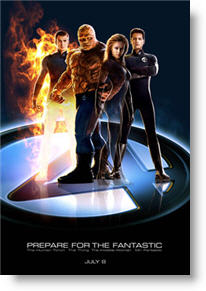
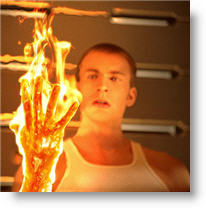
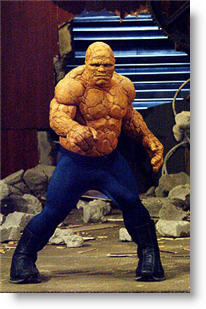
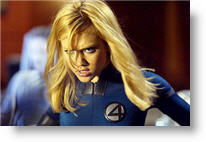
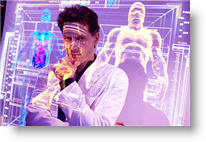
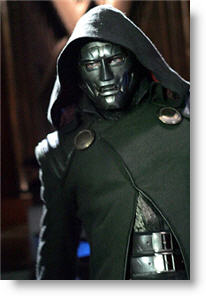
| Featuring |
|---|
|
Ioan Gruffudd … Reed Richards Jessica Alba … Sue Storm Chris Evans … Johnny Storm Kerry Washington … Alicia Masters Michael Chiklis … Ben Grimm Julian McMahon … Victor von Doom Hamish Linklater … Leonard Laurie Holden … Debbie McIlvane David Parker … Ernie Kevin McNulty … Jimmy O’Hoolihan See all » |
| Director |
|
Tim Story |
| Producer |
|
Twentieth Century Fox Film Corporation Constantin Film Marvel Enterprises See all » |
| Distributor |
“Prepare for the fantastic.”
Here’s what the distributor says about their film: “Marvel’s first family of comic superheroes takes the world by storm as the longest running comic book series in history comes to the big screen. Reed Richards/Mr. Fantastic, who can elongate his body; Susan Storm/Invisible Woman, who not only can become invisible at will but can render other objects invisible; Johnny Storm/Human Torch, who can shoot fire from his finger tips and bend flame; and Ben Grimm/The Thing, a hideously misshapen monster with superhuman strength, together battle the evil Doctor Doom.”
Wade through enough “Spider-Man” or X-Men reviews and you will no doubt get the spiel/backstory about how Stan Lee and Marvel reinvented the superhero genre. Lee and his partner, Jack Kirby are generally credited with helping comics grow up.
One way they did so was by investing the alter egos of the superheroes with human and familiar problems and weaknesses. Spiderman overlaid the traditional heroic narrative with teenage angst. The Incredible Hulk provided a reflection of readers’ own out-of-control emotions and hormones and the havoc they could play on one’s personal life.
The X-Men played on the fears of its readers that they were outsiders and freaks and their hopes that they could find a community in which they were accepted. And The Fantastic Four, well, it was the distorted mirror of the dysfunctional family before the phrase “dysfunctional family” was in play or could be understood by those readers devouring the comics but unable to articulate, exactly, how the characters’ relationships were speaking to the emerging adults as well as the eternal children inside them.
It is not a coincidence, then, that the most successful comic book movies are the ones that are able to integrate some sense of character development and human conflict with the special effects and action set pieces. Families (real or surrogate) ought to be a fertile ground for exploring the universal conflicts experienced even by those with exceptional abilities, and, in better movies, they are.
“Searching for Bobby Fischer” is one example of a film that juxtaposes themes of otherness and normalcy and invites us to learn from how those who have exaggerated versions of our problems negotiate them. “The Incredibles” was another.
There has been some reporting in the entertainment media that studio executives and producers have expressed worry that the thematic and character similarities between “The Incredibles” and “Fantastic Four” might be one reason why “Fantastic Four” will not do as well as other comic book movies.
Another reason might be that the movie pretty much stinks, which seems to be the early critical consensus. It is a consensus that I am sympathetic to, even if I don’t quite share it.
Oh, I’m sympathetic with each of the individual criticisms levied against “Fantastic Four” (and would add that dropping “the” from the title is a headache): the characters are one dimensional and often act for no discernible (or contradictory) motives, the dialogue is wincingly bad (though no more than Revenge of the Sith’s), the adult characters act like adolescents (nurse: “you’re hot”; Johnny: “so are you”), and the crowds have often been shot separately from the principles, creating the typical disconnect that can occur when actors aren’t sharing the same space.
And yet… I couldn’t quite raise myself to the level of indignation and outrage held by many of my friends and peers towards this film.
It seems to me that ever since Spielberg raised the B-movie to an “Art Form” with “Jaws” and (especially) “Raiders of the Lost Ark”, there is this assumption that the only legitimate B-movies are those that get A-movie treatments.
Certainly “Batman Begins”, with its embarrassment of Oscar talent (Caine, Freeman, Neeson, Oldman, Wattanbe, nominees all) demonstrates that a comic book film can transcend the limitations of its origins to create above average entertainment, and even X-Men shows that a certain gravitas can be lent to admittedly hackneyed material by taking it seriously.
The question I would ask, though, is whether such a treatment is the only legitimate treatment of this material. Is there no place for the B-movie as B-movie? I’m not talking about the fans of the source material who may be miffed that their favorite franchise didn’t get the A-treatment or whether it deserved it. Rather, I’m simply suggesting that “Fantastic Four” is a successful attempt at being a B-movie rather than a bungled attempt at being a serious treatment of this material.
Consider, for example the casting. Alba and Chiklis are both best known for their work in television, as are perhaps Gruffudd (Horatio Hornblower) and McMahon (Nip/Tuck). They bring with them, I would argue, a sort of comfortable familiarity with delivering one-note performances and dialogue pitched to the lowest common denominator.
Reed is a slightly repressed intellectual; Sue is the peacemaker amongst male hotheads; Johnny is the rebellious hotshot; Ben is the moody brute with the sensitive underbelly. Clich? All, yes, but isn’t that the level at which many comic books work—reducing conflicts to their most familiar and generic level to initiate adolescents into examining them?
The film didn’t strike me as having, as they say, pretensions. It was what it was—a live action comic book. That it was not more, that it did not elevate the genre in the process of transferring it to a different medium, may be true, but if that is the worst thing you can say about it, then I’m not sure where all the hostility is coming from.
I saw the film in a half full theater that had a fair amount of kids in it and none seemed to disturbed by the level of violence, which, unlike Batman’s, seemed exaggerated to the point of obvious non-realism.
In terms of Christian themes or objectionable content neither is inordinate to what one might expect. There is a lot of cartoon violence. Jesus’s name is used at least once (and maybe more) by one of the characters as a swear word. There is a moderate amount of infantile innuendo surrounding Sue having to take her clothes off when she turns invisible, especially when she is not yet in control of her powers, and Johnny is presumably living and advocating a promiscuous lifestyle. Evans plays one prolonged scene having to cover his private area with a jacket because he has burned his clothes off. Actual nudity or sex isn’t really portrayed, though, and even the former examples are played more for sophomoric laughs (like getting caught outside the locker room without your shorts) than for any potential erotic charge.
Similarly, the themes are presented in the simplest possible levels, commensurate with a cartoon treatment. Commitment to friends and family is good. (Though Ben moves on to another potential relationship very quickly after his wife leaves him.) Teamwork is necessary for good to overcome evil. Appearance is not as important as character. None of it is particularly profound nor elevated nor groundbreaking, but does it have to be?
I suppose for those who think movies are a bad idea in general and must have some elevated content or themes to justify seeing them, there isn’t really much here. Those who are hard core fans of the comic book are likely to be irritated by a perceived lack of any special treatment. The rest of us may be marginally entertained without being any more than marginally offended.
Violence: Moderate / Profanity: Mild / Sex/nudity: Minor
My Grade: C
Review page for the sequel to this movie: Fantastic Four: Rise of the Silver Surfer (2007)


The main romance in the film was between Mr Fantastic and the Invisible Girl. My congratulatations on the directors part in keeping their relationship clean and pure, which is more than I can say about the aparent sexual escapades (implied) of The Human Torch, who was continuously reprimanded by the other three for his immaturity. The bad guy is totally consumed with pride, power, greed and general selfishness which finally catches up to him in the end.
In a nut shell, a good vs. evil stereotypical set with lots of special effects and little substance. Overall, I deem it guilt-free entertainment for 13 and up.
Average/3½
Better than Average/5
Offensive/4½
Better than Average/3
Average/3½
Offensive/2½
Extremely Offensive/1
Better than Average/2
Better than Average/4
Average/5
Good/4½
Better than Average/5
Good/4½
Some of the main moral lessons that are brought out in this film are: that character is more important that appearance, (Ben, who looks like a monster) and that being different can be useful—if they hadn’t been different, even weird, they couldn’t have defeated the enemy (which demonstrates the Christian principle that God made you just the way He wanted you for whatever situations he plans to put you in).
The movie has a couple swear words, including the Lord’s name being taken in vain, a bad joke, and a small ammount of immodesty. Overall, however, it seemed relatively clean. Overall, the movie is fun and relatively clean. If you are looking for a deep, thought-provoking movie with round characters—this isn’t it, but it’s the type of movie that’s enjoyable to watch once.
Better than Average/3
Better than Average/3½
Better than Average/5
Average /3½
In my point of view, this is something that is dissapointing, disturbing among of what the expectance of this movie is, and not even along of what the comic book was about probably either. I’m 13 and expected an action filled, good, non-sexualized content in this movie, but of course I was turned down, barely any action took place and there was more non-wanted content in it instead. This movie does not need what it has in it, young children watch it and then think well that’s okay, because it’s a movie based on one of my favorite comic books. SO WRONG!
From a Christian’s point of view as well, there was not one thanks to God at all, not nothing, instead they took God’s name in vain a couple of times I think too. All in all, this movie is a total let down and something I would advise to people who want a good show not to watch.
Average/1½
Extremely Offensive / 5
—Kitty, age 13
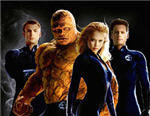

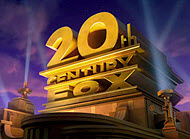
My Ratings: Better than Average/4½